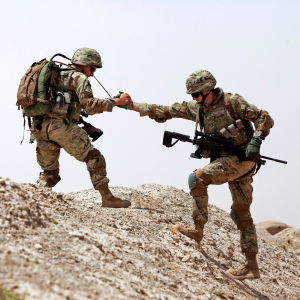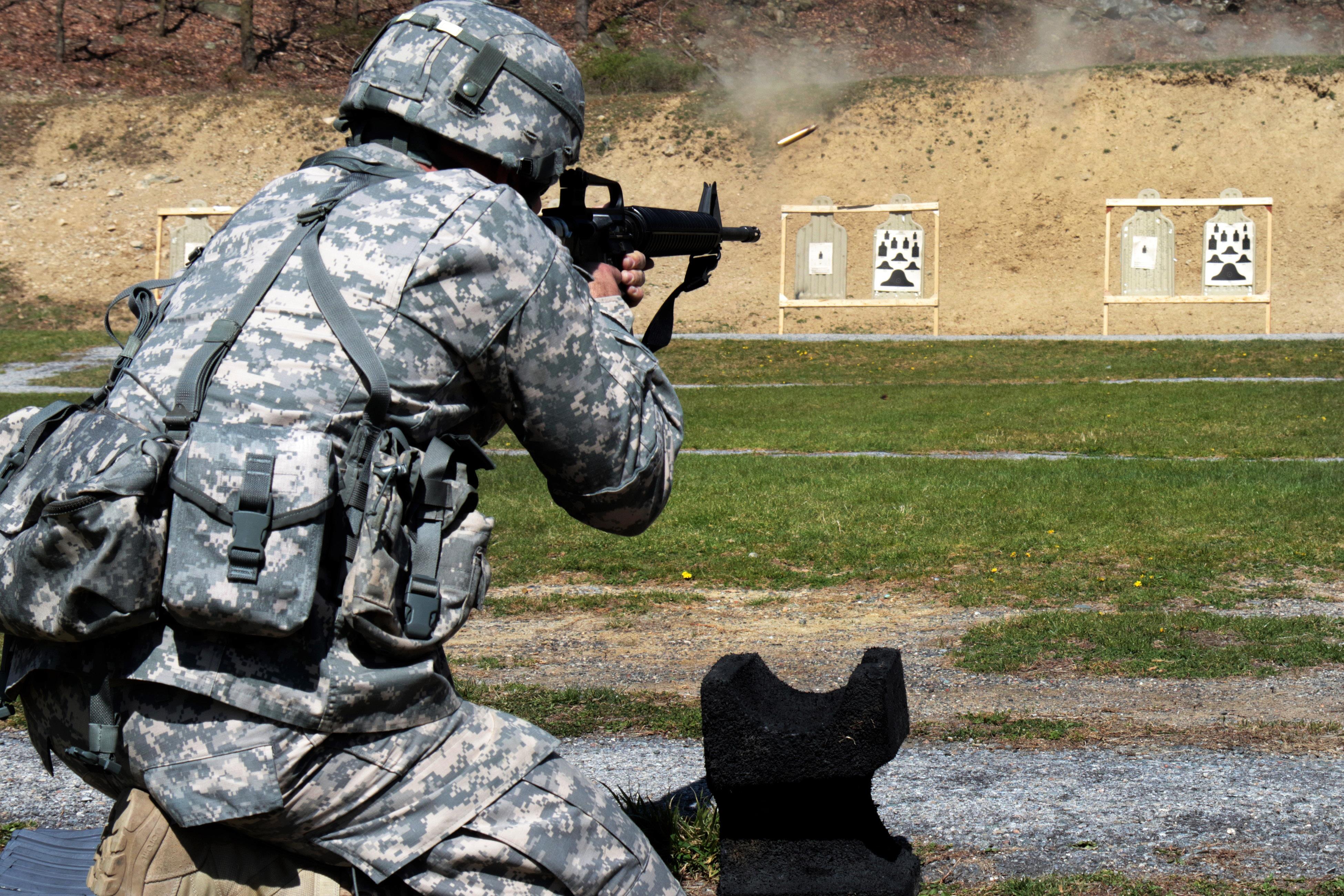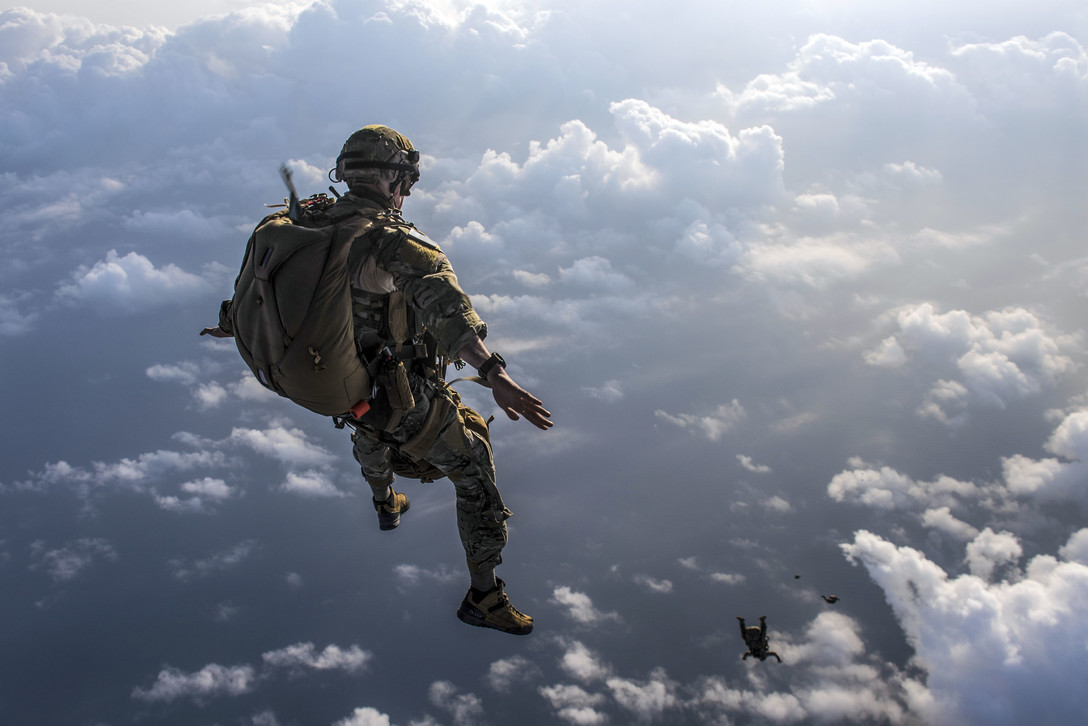
A Georgian soldier helps another soldier. Helmand province, Afghanistan, June 24, 2013. U.S. Marine Corps photo by Cpl. Alejandro Pena
What veteran, who still holds true to the values they learned in the service, doesn’t want to help their buddy out? It’s the whole concept of “battle buddy”, of the Warrior Ethos: Never leave a fallen comrade. It’s something that’s instilled in us when we were in Basic Training or Boot Camp, reinforced throughout our time in service, and one of the major challenges for many veterans when they leave…the loss of mutually beneficial support.
Sometimes, however, that can backfire.
We saw it in the service; how many times have leaders recommend that the new guy or gal stay away from “those problem children,” and were ultimately caught up in doing the wrong thing? A good troop gone bad, we say, corrupted by the lazy, mean, or disrespectful. We chalk it up to peer pressure, lament the lost potential of the “ruined joe” and shake our heads in disappointment. A colleague of mine often says, “Half the world doesn’t care that you have a problem, and the other half of the world is glad you have it.” A bit cynical, perhaps, for a therapist, but there’s a certain ring of truth to it.
But I’m no longer in the military, and this post isn’t about peer pressure, or the negative side of pulling people down. Instead, I want to focus on the danger, and the lack of awareness of this danger, in those that are being pulled down.
I see it often with the veterans I work with and in the veteran support community I’m involved in. Once a veteran starts feeling better…they have some time in sobriety, maybe, or they’re starting to manage their sense of purpose and loss, they’re kicking the depression or the PTSD in the face…then they want to turn around and help other veterans. That’s great; I’m all for it. The feeling that comes from helping our brothers and sisters is one of the greatest in the world. The problem is when we start to do it too soon, and the danger is slipping back down the slope of the pit that we just pulled ourselves out of.
Take a look at four thoughts on the dangers of trying to help others when we’re not at a stable place ourselves.
The Easiest Way to Forget Your Problems is to Help Someone Else With Theirs
Over and over again, I see it; rather than focus on their own challenges, veterans want to turn around and help other veterans. Some of it comes from the battle buddy concept, I get it, but it can also be another form of avoidance. How do I take my mind off of my problems? Help others with theirs! Maybe this is a non-cynical aspect of the “half the world is glad you have a problem” statement: “I’m glad you have a problem so I can help you fix it.” The challenge is, intent and ability are not always equal. We start out with good intentions, but overestimate our ability to solve the problems of others. We may not fully understand how we got to this semi-stable place, but since we’re starting to feel good, we want to pass it on. Each of these can be dangerous to our stability.
If You’re Not Stable, You Could Be Pulled Down Again
Consider this: you’re climbing up a steep hill. You’ve gotten to a place where it’s a little easier, and want to turn around and help the person behind you. If you don’t take time to plant your feet, ensure that you’ve got a good grip on where you’re at, then when you reach back to pull them up: you might find yourself back down there. You might be moving too fast. Maybe the person behind you isn’t ready to get where you’re at, so you reach farther…and farther…and soon, your center of gravity off balance, you tumble down. It’s hard for a veteran to look back and see another veteran struggling, and not do all we can to get them to where we’re at. The fact that we often forget: you have to want it. We had to want stability, wellness, peace in our lives to get where we’re at, or else we wouldn’t have gotten to where we are. We sometimes think we can put that desire, that motivation, into others, but we can’t. When we try…we’re in danger.
Once You’re Down, You’re Where You Are, Not Where You Were
The problem with tumbling back down is that you’re now going to have to make the climb again. You may beat yourself up, looking up at the place you were, judging yourself. That’s not helpful. Sometimes, the person you were trying to help, the one who pulled you down, is no longer around. Maybe they slid farther back down the slope. Maybe they left on their own, or some other circumstances removed them from your life. Sometimes, and this is the one that really gets you, they climbed on your back and used your shoulders to get to a place of their own stability…then didn’t reach back down and help you up. I get it: that sucks. There’s anger there. Vengeance. The problem is, we can be angry, frustrated, beat ourselves up all day long, but unless we do something about it, we’re just going to be stuck. It’s the truest meaning of that Buckaroo Banzai quote: “Wherever you go, there you are.” Start where you’re at. How you got there is important, but it’s not important enough to keep you there.
You Got There Once, You Can Get There Again
One thing we have going for us: we know stability is possible. Wellness is possible. We may have a long way to get back to where we were, but we know it’s possible to get there: we were there before. We may even still have the tools we used to get there the first time, still believe in them and know how to use them. That may make getting back up there easier. Either way, we know that stability is possible, but like I said earlier: you have to want it. Again. And again and again, as long and with as much effort as it takes.
Don’t get me wrong, I’m not saying don’t help people. By all means, help others. In my opinion, that’s the surest path to peace in this life, to pass along help. The challenge is when we try to help others and we’re not in a good place ourselves; we have to be aware of the danger.

The Head Space and Timing Blog is supported by the Colorado Veterans Health and Wellness Agency, a 501(c)3 Nonprofit in Colorado Springs, Colorado. The goal of the CVHWA is to provide military culturally competent mental health counseling to veterans and their spouses, regardless of characterization of discharge, time of service, or era of service. Our vision is to assist veterans to identify and remove barriers to their mental, physical, emotional, and behavioral wellness. For questions or inquiries, contact us!


